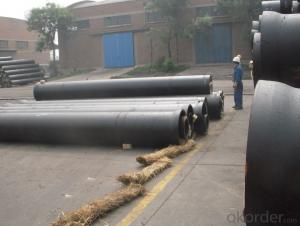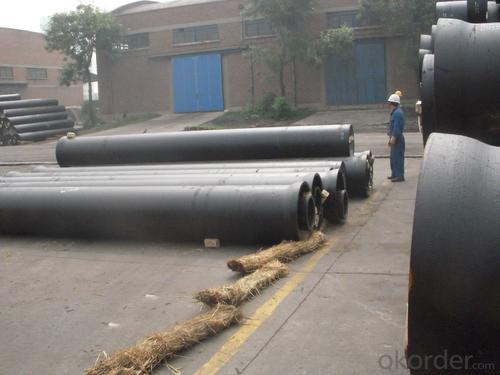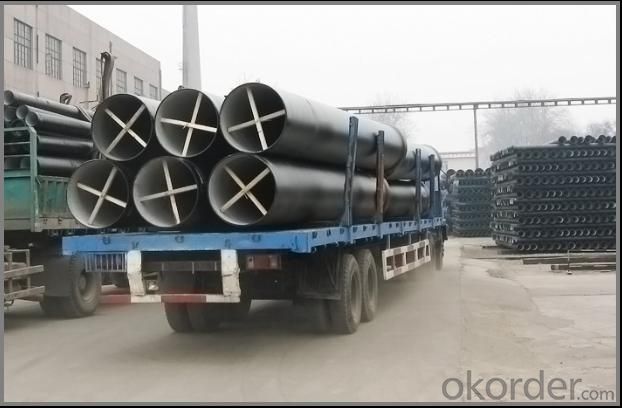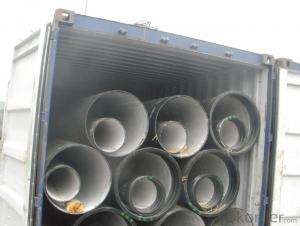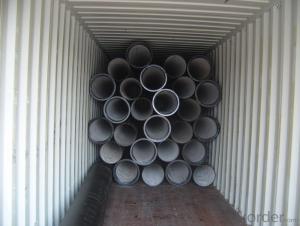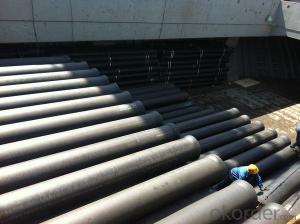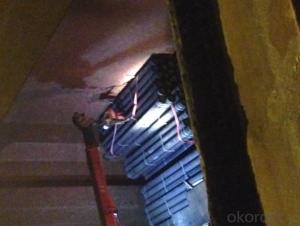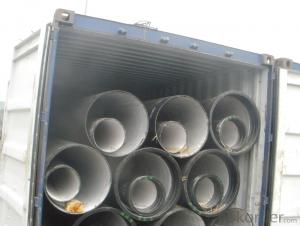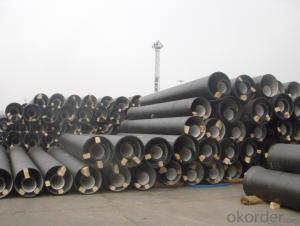DUCTILE IRON PIPE AND PIPE FITTINGS C CLASS DN1100
- Loading Port:
- Tianjin
- Payment Terms:
- TT OR LC
- Min Order Qty:
- 23 pc
- Supply Capability:
- 3000 pc/month
OKorder Service Pledge
OKorder Financial Service
You Might Also Like
· Material : Ductile Cast Iron
· Size Range : DN 80mm to DN 2000mm
· Unit Effective Length : 6m or 5.7m
· Manufacture Standard: ISO 2531:1998/ EN 545:2006/EN 598:2007
· Annual capacity : 200,000 tons
· Coating Exterior: Zinc 130g/m2 according to ISO 8179-1 and bitumen coating 70 microns.
· Cement Interior: Portland Cement/ High Alumina Cement/ Sulphate Resisting Cement Lining according to ISO 4179
· Special requirements on external coating and internal lining can be applied
· We also provide accessories such as SBR/EPDM rubber gaskets, lubricant paste, pipe caps, PE sleeves, etc.
Additional Parts:
Each pipe is strictly inspected according to related standard to ensure permanently high performance.
Easy Installation at site and service free for life
Long Service Lifespan
Quotation will arrive you within 24hours once we get your inquiry.
We guarantee offering you a competitive price.
A copy of original inspection reports of pipes will be offered after shipment.
Photos of loading process will be sent to the customer after shipment effect.
We will follow-up the delivery progress after shipment effect and update to the customer on weekly basis.
- Q: Can ductile iron pipes be used for pressure relief systems?
- Yes, ductile iron pipes can be used for pressure relief systems. Ductile iron pipes are known for their strength, durability, and ability to withstand high pressure conditions. They have a high resistance to internal and external pressures, making them suitable for use in pressure relief systems. Additionally, ductile iron pipes can handle significant changes in pressure without compromising their structural integrity. Therefore, they are commonly used in applications where pressure relief systems are required, such as water supply networks, wastewater treatment plants, and industrial processes.
- Q: The difference between cast iron pipe and ductile iron pipe
- Cast iron pipes, also known as pig iron pipes, ordinary gray iron. Often used in socket connection, the sealing material is usually cement rigid interface.
- Q: What are the advantages of using ductile iron pipe over concrete pipe?
- Using ductile iron pipe instead of concrete pipe offers several advantages. To begin with, ductile iron pipe has a higher strength-to-weight ratio, making it capable of withstanding higher pressure and loads while being lighter. This makes it easier to handle and install, ultimately reducing labor costs and saving time. Additionally, ductile iron pipe has superior corrosion resistance, making it less susceptible to rust or degradation over time. This extends its lifespan and reduces the need for frequent repairs or replacements, making it a more cost-effective option in the long run. Moreover, ductile iron pipe is more flexible and resilient compared to concrete pipe. It can withstand ground movement, settling, and other environmental factors without cracking or breaking. This reduces maintenance and repair costs, ensuring its durability. Furthermore, ductile iron pipe has a smoother interior surface, resulting in improved flow characteristics and reduced friction. This allows for more efficient transportation of fluids and minimizes the risk of clogs or blockages, guaranteeing uninterrupted flow. Lastly, ductile iron pipe is highly versatile and suitable for a wide range of applications. It can be used for both above-ground and underground installations, making it ideal for various infrastructure projects such as water supply systems, wastewater treatment plants, and industrial applications. In conclusion, the advantages of using ductile iron pipe over concrete pipe include its higher strength-to-weight ratio, superior corrosion resistance, better flexibility and resilience, smoother interior surface, and versatility. These benefits make it a reliable and cost-effective choice for various infrastructure projects.
- Q: What are the different types of restrained joints for ductile iron pipe?
- Ductile iron pipe has several types of restrained joints available to prevent pipe separation or movement caused by internal pressure, external forces, or ground movement. The commonly used restrained joints for ductile iron pipe are as follows: 1. Mechanical Restrained Joint: This joint employs mechanical devices like bolts, nuts, and gaskets to secure the pipe. It typically consists of a gland, a gland follower, and a restraint ring. The gland and gland follower compress the gasket against the pipe, while the restraint ring provides additional support and resistance against movement. 2. Push-on Restrained Joint: This joint uses a rubber gasket that compresses when the two pipe ends are pushed together. The gasket not only provides a tight seal but also acts as a restraint against movement. Some push-on restrained joints may include additional mechanical devices to enhance the restraining capability. 3. Restrained Flange Joint: This joint combines the characteristics of a flanged joint and a restrained joint. It involves a flanged pipe end that is bolted to a flange on another pipe or fitting. The bolts and nuts offer the mechanical restraint, while the flange connection ensures a secure and leak-free joint. 4. Restrained Coupling Joint: This joint is a variation of the mechanical restrained joint. It utilizes a coupling that is either bolted or clamped around the pipe ends to provide the necessary restraint. The coupling may also have a gasket to ensure a tight seal. 5. Restrained Socket Joint: This joint is similar to the push-on restrained joint, but it incorporates additional mechanical devices to enhance the restraining capability. The socket end of the pipe is typically designed to receive a pipe spigot, which is then secured using bolts, clamps, or other mechanical devices. These diverse types of restrained joints for ductile iron pipe offer different levels of restraint and are chosen based on the specific requirements of the application. They guarantee the stability and integrity of the pipeline system, minimizing the risk of leaks, pipe separation, or movement.
- Q: How are ductile iron pipes different from PVC pipes?
- Ductile iron pipes are made from a type of iron that has a higher strength and durability compared to PVC pipes, which are made from a type of plastic. Ductile iron pipes are more suitable for high-pressure and underground applications due to their superior strength, while PVC pipes are commonly used for low-pressure and aboveground applications. Additionally, ductile iron pipes have a longer lifespan and can withstand higher temperatures, making them more suitable for a wide range of environments.
- Q: How to control mortar proportioning in ductile iron pipe cement coating
- The calculation steps are: first to calculate the amount of plastering engineering (area), and then check the "national construction basic quota" quota in the corresponding amount of mortar project, engineering quantity multiplied by the amount of mortar that fixed amount of mortar, the mortar amount multiplied by the corresponding mix ratio of mortar, the consumption of raw materials can be obtained.
- Q: Can ductile iron pipes be used for cooling water systems?
- Yes, ductile iron pipes can be used for cooling water systems. Ductile iron pipes are known for their durability, strength, and corrosion resistance, making them suitable for a wide range of applications, including cooling water systems. These pipes have the capacity to handle high pressure and temperature fluctuations, making them ideal for circulating and transporting cooling water. Additionally, ductile iron pipes have a smooth internal surface that reduces friction and minimizes the risk of scaling or clogging, ensuring efficient flow of the cooling water. Therefore, ductile iron pipes can be a reliable and efficient choice for cooling water systems.
- Q: How are ductile iron pipes different from other types of pipes?
- DI pipes, also called ductile iron pipes, possess unique properties and are manufactured differently from other pipe types. They are specifically designed to withstand high-pressure systems and offer exceptional strength and durability, setting them apart from PVC, steel, or concrete pipes. One significant distinction lies in the material used. DI pipes are made from a type of cast iron containing additional elements like carbon and silicon, which give them remarkable strength and flexibility. This composition enables DI pipes to handle high-pressure systems, making them suitable for applications requiring reliable water supply, such as water mains, sewer systems, and industrial pipelines. Another distinguishing feature of DI pipes is their ability to endure external loads and pressure. They possess high tensile strength, enabling them to bear heavy loads without cracking or breaking. This property makes them ideal for underground installations, where they can withstand the weight of soil, traffic, and other external factors. Furthermore, DI pipes exhibit excellent corrosion resistance. They are coated with a protective layer, typically through cement lining, which safeguards against rust and corrosion caused by the elements, chemical reactions, or transported fluids. This corrosion resistance significantly extends the pipes' lifespan, reducing maintenance and replacement costs over time. Additionally, DI pipes offer great flexibility. They are renowned for their ductility, meaning they can deform under stress without fracturing, making them less prone to cracks and leaks. This inherent flexibility allows them to withstand ground movement and seismic activities, ensuring a safe and reliable water distribution system. Regarding installation, DI pipes are relatively easy to handle due to their lighter weight compared to materials like concrete or steel. They are also available in various lengths and diameters, making them adaptable to different project requirements. In conclusion, DI pipes distinguish themselves through their exceptional strength, resilience, corrosion resistance, and ease of installation. These properties make them the preferred choice for numerous infrastructure projects, where reliability and longevity are critical factors.
- Q: Are there any specific standards or regulations for ductile iron pipe?
- Yes, there are specific standards and regulations for ductile iron pipe. Ductile iron pipe is commonly used in water and wastewater systems due to its strength and durability. The most widely recognized standard for ductile iron pipe is the American Water Works Association (AWWA) C151 standard. This standard covers the minimum requirements for ductile iron pipe, including materials, dimensions, tolerances, and testing methods. It also provides guidelines for the manufacturing, installation, and maintenance of ductile iron pipe systems. In addition to the AWWA C151 standard, there are also other standards and regulations that govern the use of ductile iron pipe in different countries. For example, in Europe, ductile iron pipe is governed by the EN 545 and EN 598 standards, which specify the requirements for ductile iron pipes and fittings used in water supply and wastewater systems. Furthermore, government agencies such as the Environmental Protection Agency (EPA) in the United States may have specific regulations and guidelines for the use of ductile iron pipe in certain applications, such as drinking water systems. It is crucial for manufacturers, contractors, and engineers involved in the design, installation, and maintenance of ductile iron pipe systems to ensure compliance with these standards and regulations. This helps to ensure that ductile iron pipe is manufactured to the highest quality standards, and that it is installed and maintained properly to ensure its longevity and reliability in water and wastewater systems.
- Q: What pipe can be used to replace the cast iron pipe in the water supply? Thank you
- According to the casting method, it is divided into continuous cast iron pipe and centrifugal cast iron pipe, in which the centrifugal cast iron pipe is divided into sand mould and metal type two kinds. Divided into gray cast iron pipe and nodular cast iron pipe according to different material. According to the interface form, it is divided into flexible interface, flange interface, self anchored interface, rigid interface and so on. Among them, the flexible iron pipes rubber sealing ring; flange interface cast iron pipe flange fixed in the rubber pad, the flange gasket sealing; rigid interface cast iron pipe socket is large, straight pipe is inserted, sealed with cement, this technology has been basically eliminated.
Send your message to us
DUCTILE IRON PIPE AND PIPE FITTINGS C CLASS DN1100
- Loading Port:
- Tianjin
- Payment Terms:
- TT OR LC
- Min Order Qty:
- 23 pc
- Supply Capability:
- 3000 pc/month
OKorder Service Pledge
OKorder Financial Service
Similar products
Hot products
Hot Searches
Related keywords
